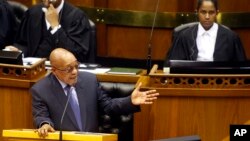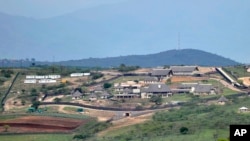South Africa's embattled president has emerged intact from his latest challenge, this one from within his own party. The ruling African National Congress (ANC) held lengthy, closed-door meetings on party members’ calls for President Jacob Zuma to resign, but ultimately decided to let him stay.
Zuma has been given his reprieve by top members of the ANC. Tuesday’s announcement caps three days of intense discussions by the nation’s leading political actors as the president’s public esteem continues to drop amid growing accusations of corruption.
ANC Secretary-General Gwede Mantashe said the discussions among the six-member National Executive Committee, a group that includes Zuma, were “robust, candid and... at times, difficult.” “The NEC did not support the call for the president to step down,” he said.
South Africa's anti-corruption czar recently released a 355-page report documenting the president’s links to a wealthy family whose members have allegedly steered Cabinet decisions and improperly influenced government contracts.
The corruption allegations have prompted opposition calls for Zuma’s resignation. The mounting scandals also hurt the ANC in municipal polls earlier this year, leading them to lose control of several major cities.
But the party’s comfortable majority in parliament allowed Zuma to defeat a no-confidence vote earlier this month.
‘Gaining momentum’
The most recent challenge to Zuma came as a surprise when three ANC stalwarts - the nation’s tourism minister, health minister, and public works minister - called for the president's resignation, prompting the discussions.
The ANC National Executive Committee (NEC) has the power to demand the president’s resignation. It has used it once before, in 2008 ousting President Thabo Mbeki to open the door for Zuma.
Analyst Aubrey Matshiqi said he does not think the committee’s refusal to make Zuma step down means they have confidence in him.
“Last weekend’s meeting of the NEC, the national executive committee of the ANC, was a turning point because what it does signal is the possibility that the battle to get rid of Jacob Zuma as president of the party and/or the country is gaining momentum. The question is whether those who are opposed to Jacob Zuma will have enough support to dislodge him before the national conference of the ANC in December next year.”
Matshiqi said the next big battle will come then, when the party chooses a presidential candidate for the 2019 election, when Zuma’s second term ends. “We are now on the cusp of what may be a divisive and bruising succession battle,” Matshiqi said.
After a wild year, observers say South African politics may get even wilder in 2017.





